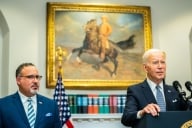You have /5 articles left.
Sign up for a free account or log in.
Some books from 2016 that education types may be interested in.
Composition in the Age of Austerity by Nancy Welch and Tony Scott
This is a book I wanted to write about in much more detail, and because of that desire, I kept putting off writing about it, so here we are, the end of the year and I still haven’t mentioned it in this space.
A collection of essays, the book is in my personal wheelhouse because it looks at the work of teaching writing through the lens of both teacher and student labor, and outlines the ways austerity politics have undermined the mission of education in general and writing education in particular. Austerity is the driving force behind just about any decision made about or in the writing classroom: class size, curriculum, scholarship.
As one example, research and scholarship that seeks out “efficiency” – particularly utilizing technology – finds favor in the form of grants, while research into “efficacy” may be marginalized. The book includes sections discussing practical approaches to this reality, as well as opening avenues for moving into a different reality where austerity is no longer a cudgel meant to bring faculty and students to heel.
The volume is primarily oriented towards those working in English and composition, but I think any academic immersed in the instructional side of the job would find much to reflect on in their own work.
Paying the Price: College Costs, Financial Aid, and the Betrayal of the American Dream by Sara Goldrick-Rab. The Great Mistake: How We Wrecked Public Universities and How We Can Fix Them by Christopher Newfield.
I always recommend these books as a pair because together they tell us all we need to know about the state of public higher education at every level of the enterprise. We have collectively turned our backs on supporting public higher ed and providing access and opportunities to all who deserve them. To change this, we only need to make different choices.
I wrote an appreciation of both in my other guise at The Biblioracle for the Chicago Tribune.
I also recommend Dean Dad Matt Reed’s review of Paying the Price for additional insight.
And here’s a good interview with Christopher Newfield about The Great Mistake.
Small Teaching: Everyday Lessons from the Science of Learning by James Lang
There is no writer I go to more often than Lang when it comes to looking for inspiration inside the classroom, and Small Teaching provides dozens of “small” – meaning instantly actionable – things one can try for themselves.
Rather than the uncertain and difficult work of rethinking a course, these approaches point towards techniques that bridge the structural divides between students and instructor and students and material. Even the minutes before the start of class can be utilized in a way that invite students to connect.
My only beef is that the book feels the need to be grounded in the “science of learning,” a move I understand because it’s the “science of learning” that we’ve come to put our faith in, but I see Lang’s techniques rooted in a more fundamental place where we treat students as the rounded, complicated, curious human beings we know them to be and relate to them as the rounded, complicated, curious human beings we are ourselves.
To the extent the science of cognition proves that learning is a human activity built on relationships I’m all for it, but that doesn’t make it necessary to tell us what we already know.
For White Folks Who Teach in the Hood…and the Rest of Y’all Too by Christopher Emdin
Even though I don’t teach K-12 education in an urban environment, I called this, “The most important work of pedagogy I’ve read in the last ten years,” because it introduced me to Emdin’s framework of “Reality Pedagogy” which I realized is a concept I’ve been progressively gravitating towards in my own work.
Even though I work in higher ed, it was actually more helpful to read a book discussing the application of Reality Pedagogy in secondary education because it forced me to extend the approaches to my personal sphere.
For more, I reviewed the book here.
I Love Learning; I Hate School: An Anthropology of College by Susan Blum
This is an insight into the reality when it comes to how students view the purpose and function of school. If we wonder why students aren't fired up for learning it might be because they've absorbed an ethos of credentialing above one of curiosity and learning. Every insight and quote from students resonated with my experience as an instructor.
My Q&A about the book with Dr. Blum can be found here.
Lab Girl by Hope Jahren
A memoir of life as a plant biologist which may sound dull, but Jahren brings her own fascinations not just about plants and soil, but about people and learning as well, alive on the page. A great example of the power and necessity of curiosity to drive one’s life.
Would make a great campus reads book.
The Nix by Nathan Hill
While our protagonist, Samuel Andresen-Anderson is a contingent instructor at a Chicago-area college, this isn’t strictly an “academic” novel, and yet those in higher ed (and anyone else for that matter) will find much to enjoy in this story of a mother and son breaking apart and attempting to come back together.
For the writing instructors in the audience, one chapter is a stand alone tour de force where an encounter between Andresen-Anderson and a cheating student running through her excuses for her academic dishonesty is rendered in a series of logical fallacies. I cringed and laughed in equal measure.
If you have an education-related book you recommend, leave it in the comments. ‘Tis the season for reading.





